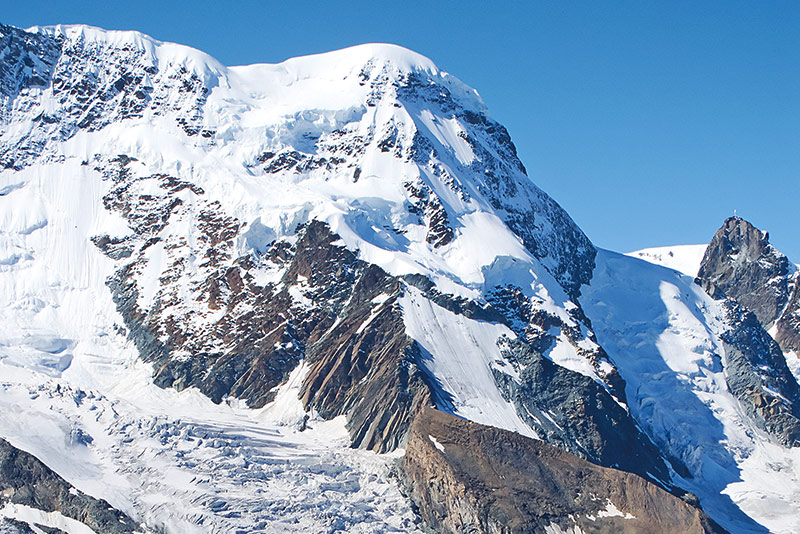Unlocking the secrets of glacial dynamics
DPhil scholar Gonzalo González de Diego is using his expertise to better understand and predict the dynamics of glaciers.
Advancing scientific methods to further understand the Earth’s climate is a key objective of DPhil scholar Gonzalo González de Diego’s work. However, perhaps surprisingly, Gonzalo is not an environmental specialist: he’s a mathematician.
‘Understanding the evolution of the line where ice, continent and ocean meet – known as the grounding line – is a critical factor when making any sort of prediction on sea level rise and the melting of ice sheets. Subglacial cavitation – a phenomenon whereby the ice of a glacier detaches from the bedrock on the lee (sloping) side – is a much smaller-scale, quite niche problem. But it’s a fundamental mechanism in understanding how glaciers slide,’ says Gonzalo.
The dynamics of glaciers are poorly understood, but tools and concepts from mathematical and numerical analysis are capable of providing valuable insights into their behaviour. Gonzalo sees his doctoral research as a numerical and glaciological investigation of ‘contact problems’ – a set of mathematical equations designed to address the possibility of contact and detachment – specifically relating to subglacial cavitation and grounding line dynamics.
 The dynamics of glaciers are poorly understood © iStock
The dynamics of glaciers are poorly understood © iStock
He says: ‘Although it’s mostly glaciologists who are looking at these problems, these mathematical structures have a great deal to offer. Grounding lines and subglacial cavitation are very different physically, but very similar mathematically, and both are incredibly important. We believe that there is a great deal of scope for using the mathematical applications that we’re exploring. I’m at a relatively early stage of my research, but the mathematical structure I’m working on is fundamental to correct simulations. This is something that we can exploit to get more accurate and robust ‘solvers’ – computer-generated approximate solutions to complex problems – for systems of equations that model glacial detachment.’
A number of issues can complicate these calculations from a mathematical point of view, rendering the solvers extremely unstable. For example, one small parameter in a simulation might change, such as the temperature, and that can have a big impact. ‘My aim is to look at the possibilities and increase the robustness, the stability and accuracy of the modelling,’ says Gonzalo.
‘Studying subglacial cavitation is looking at some of the most fundamental mechanisms involved in glacial sliding. I think it’s almost on par with grounding dynamics: it’s actually something very important’
Originally an engineering student in Spain, Gonzalo subsequently took up a research role in Germany, conducting numerical analysis from an engineering perspective. He was ‘attracted by the elegance and exactness of the mathematics’, which then led him to study for a master’s degree in mathematics at Oxford. He moved on to a DPhil in 2019 thanks to funding from the Oxford Mathematical Institute Fund (OMIF).
OMIF provides scholarships and flexible financial support to graduate students from around the world, and is supported by donations. ‘Removing financial barriers for our graduate students is of utmost importance,’ says Sam Howison, Professor of Applied Mathematics in the Mathematical Institute. ‘Through OMIF, we are able to nurture the next generation of mathematicians and give them the freedom to explore today’s most intriguing and important mathematical questions. We are grateful to all those who have supported OMIF to date.’
‘I feel very lucky to be in Oxford, for sure,’ says Gonzalo. ‘I’m pretty much given absolute freedom by my supervisors.’ He views his DPhil very much as a collaboration: Gonzalo works with Professor Patrick Farrell – ‘he does scientific computing and numerical analysis to make computations possible,’ says Gonzalo – and Professor Ian Hewitt – ‘an applied mathematician who is very focused on glaciology,’ he adds.
Gonzalo is learning as much as possible about the challenges that the glaciologist community is currently facing, so that his research is impactful. The freedom that his DPhil affords him means that, at the time of writing, Gonzalo is planning to join a summer school visiting a glacier in the Alps in Italy with environmental scientists. ‘It feels quite incredible that I can do analytical work like that,’ he says.
There are a number of options open to Gonzalo in terms of next steps, including a career in academia or education, ecological consulting, or contributing to the kinds of intergovernmental reports that he himself has drawn upon in the course of his work to date. As he weighs up the options, Gonzalo says that he is sure of one thing: ‘I have become quite serious about the broader landscape into which my work fits, especially from a moral and ethical point of view. There’s so much we can do. I’m extremely happy with my current project and the situation I’m in. Definitely.’
SUPPORT STUDENTS AT OXFORD